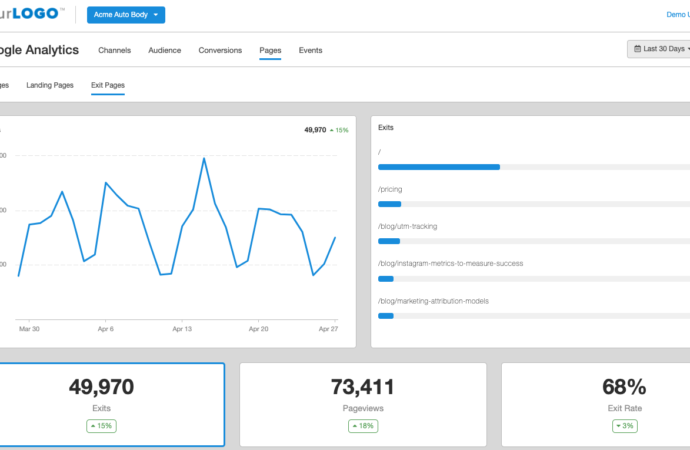Monitoring the right KPIs is the best way to avoid spending time and money on something that isn’t driving the expected profit
SEO Metrics to Track or Measure, 7 tool You Need to Level Up Your Website; Key Performance Indicators (KPIs) are important ways to gauge current SEO performance. Every business opts for SEO having some goals in mind. The primary goal is to generate revenue. But, how to achieve this? Search Engine Optimization (SEO) metrics give you a defined path where you are and where you need to head towards. It is the best way to channelize opportunities, track progress, quantify results, and reach the destination. Let’s discuss these approaches further in the article.
Data to tell you what’s going well, and data to inform you of what needs improvement.
In this guide, we share the top seven SEO KPIs in 2021. We discuss what they are and how to properly track them, including:
- Organic Traffic
- Keyword Rankings
- Google My Business Metrics
- Leads / Phone Calls / Sales
- Bounce Rate
- High Impression / Low Click Pages
- Page Load Speed
What are the SEO metrics and KPIs to track or measure the success of your website? You Need to Level Up Your Website!
First thing first, where to begin the process of tracking your website performance? Let’s see the items from the backend. For any business to sustain revenue generation is crucial. And income can be generated when target customers will visit your website. Users visit search engines with some query, search for the relevant brand to get services or search for similar products.
Now, how will search engines enlist your website on the first page of SERPs? You can focus on the user’s keywords, deliver appropriate content, and give reliable services or products. So, this is how the dots connect for the deal to be done. These are the seven main SEO metrics and KPIs to Measure or Track:
Organic traffic reach
Organic traffic means how many genuine visitors you are getting from search engines like Google, Bing, DuckDuckGo, etc. There are many SEO tools available with which you can track organic traffic reaching your website.
When you keep on working on optimizing your on-page, off-page, and technical SEO parameters, you can see exponential growth in your organic traffic. Why is it so? Most people don’t go past the first page of SERPs. After reaching the first page, your target must be to move your ranking upwards. It will bring even more traffic.
Keywords ranking position
Keyword rankings position is an important SEO (search engine optimization) metrics. It uplifts website performance to a great extent. You can use keyword finders like Ahrefs, Google Analytics, keywordtool.io, and others to see keyword ranking.
The higher the keyword ranking, the better it is. The position first and second are keywords with search volume. It will bring more users to your website. On the other hand, there are long-tail keywords that have less competition. So, you can rank higher for these keywords.
Conversion Ratio and capturing leads
The conversion ratio and capturing more leads is the crucial KPI. SEO marketers can accomplish it by conversion ratio optimization (CRO). The thing that matters the most is what your buyer’s persona is. Analyze their concern areas, the problems they are facing, and the possible solutions to their issues. Consider these factors:
- What type of CTA drives them the most?
- Are they able to relate to your content?
- Check if your presentation is going through the awareness, consideration, and decision stage.
It helps in building trust, increasing customer base, and improvement in sales. Also, you can contact North Carolina SEO Company for better CRO and overall enhancement of website performance.
User experience parameters
The user is the leading contender in the whole SEO game. The main focus on search engines and markets is users only. So, what sort of experience are you giving them?
- The loading speed of the website determines whether users will continue seeing your web page.
- Clutter-free and straightforward website navigation is necessary to give a soothing experience to the visitors.
- Highlighting your CTAs and making them impressive leads to more sales.
CTR and Bounce rate
Click through Ratio (CTR), and bounce rate are related KPIs to each other. CTR indicates you are attracting more visitors to your website. On the other hand, high bounce rates mean
- Visitors were not looking for similar products or services.
- Content is not good; it might be clumsy, poor readability or crap content is there.
- Website loading is more than four seconds.
- The website is not responsive for mobile devices.
When you lack these parameters, it drives away your customers. The best thing is to rectify these issues as soon as possible.
Time spent on the webpage
Time spent on the web pages significantly matters for the search engine to determine your rankings. Providing worth reading and engaging content can boost this factor. Furthermore, use relevant tags, meta descriptions, and schema markup to attract your website’s right kind of audience.
Webpages visited per session
This SEO metric tells that visitors like your content. And they are curious to get more information on that.
Customer retention rate
Customer retention rate is an essential KPI. It governs repetitive customers on your website. When you provide trustworthy information, quality products, and services, it develops strong trust in the minds of your customers. They love to come back to you to avail your services.
Summing up: tips on choosing SEO metrics and KPIs to track
When you measure everything at your disposal, this is a telltale sign that you don’t know what to measure. In the end, KPIs make your optimization journey beautiful, specific, and timely. Here are a few useful SEO metrics tips to help you stay on the right track:
- Generate content according to target keywords and buyer’s persona.
- How much are you able to attract organic visitors and convert them into leads?
- Is your content up to the mark to grab the attention of the users?
- Are your customers coming back to you again or not?
- Find the balance between measuring everything you can and tracking several single metrics. Keep in mind that if you choose an SEO KPI that won’t be achieved, you will have wasted hours of valuable time.
- Create KPI time frames as it’s very important to have a starting point and a deadline to reach set goals.
- Find the direct connection between your business goal and SEO KPIs, but remember that different niches and businesses require different KPIs—there is no universally applicable list. There are no bad and useless metrics—only inappropriate usage.
So, assess these factors from time to time to raise your website’s level for both users and search engines. And remember that to avoid tracking false SEO KPIs, don’t get obsessed with SEO metrics, but analyze them in relation to the business impact they give.
















Leave a Comment
Your email address will not be published. Required fields are marked with *